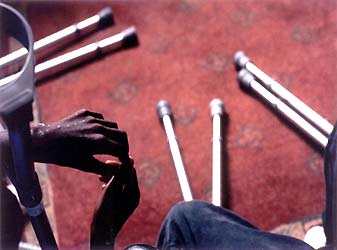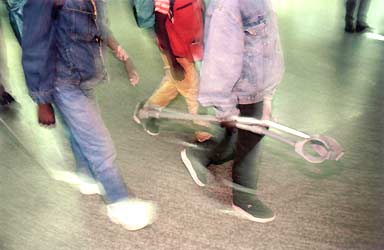reportage Crippled harvest













To view story please scroll to the right
| September 2001 | Archive | Read article | © Rui Xavier reportage Crippled harvest |
||||||||||||||||||
 |
 |
 |
 |
 |
 |
 |
white |  |
 |
 |
white |  |
 |
white |  |
white | ||
| José José draws on the blackboard | Lisbon Airport Waiting for the children, a wheelchair on the "Arrivals" platform of the Lisbon airport | Military Hospital Silent and shy: the children await for their first meal in the canteen of the military hospital | Jacinto Jacintos' hands reveal the wounds caused by a landmine that also left him partially blind | Salvador Salvador resting in the sofa of the physiotherapy room | André and Moisés André and Moisés during a physiotherapy session | André André takes a nap after a tiring physiotherapy session that prepares the legs' muscles for the use of a prosthesis | Francisco (left) Francisco's' custom made hands prosthesis. (middle) Months later Francisco uses the prosthesis that allow him to simple tasks as drinking and eating with no autonomously which was impossible before. (right) Francisco lost both his arms when he was only 14 while forced to fight on the war front by the FAA (Angolan Armed Forces) | Evangelista Evangelista watching TV | Paulo Paulo with his new earrings, more than just irreverence, in Angola these will symbolize new found wealth and fortune | Departure Children walk on the "Departures" lounge of the Airport without the help of crutches | white | |||||||
| The photographer Rui Xavier witnessed a group of ten young Angolan landmine victims preparing for a new future in the Portuguese Military Hospital of Coimbra To view story please scroll to the right |
back to beginning | |||||||||||||||||